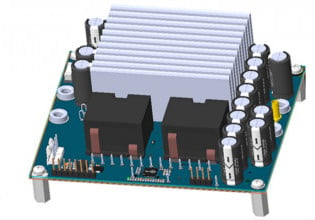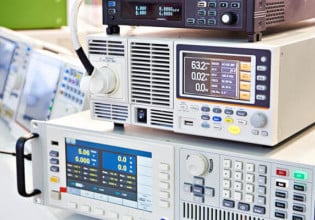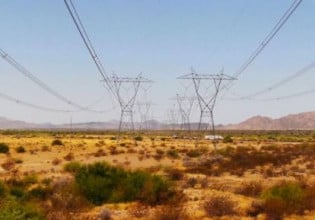China’s Sinovel Indicted in the United States for Stealing AMSC Trade Secrets
American Superconductor (AMSC) today requested that the Obama administration and Congress re-evaluate the U.S. trade relationship with China in conjunction with the Department of Justice (DoJ) indictment of Sinovel Wind Group Co., Ltd. and two of its employees for the theft of AMSC's trade secrets. Following an investigation by the Federal Bureau of Investigation (FBI), the DoJ today charged Sinovel and two of its employees with the theft of Massachusetts-based AMSC's proprietary software code and the use of that intellectual property in four 1.5 MW Sinovel turbines that have been installed in the Massachusetts towns of Charlestown, Fairhaven, and Scituate. Those parties and their contractors are not implicated in any way.
"We have worked with law enforcement to verify that these Sinovel-manufactured wind turbines contain AMSC's stolen intellectual property," said Daniel P. McGahn, AMSC's President and CEO. "The fact that Sinovel has exported stolen American intellectual property from China back into the United States – less than 40 miles from our global headquarters – shows not only a blatant disrespect for intellectual property but a disregard for international trade law. These criminal acts have led to significant financial harm to AMSC, its employees and their families as well as its shareholders. Over the past two years, more than 500 staff members worldwide have lost their jobs following Sinovel's egregious and unlawful behavior."
In September 2011, AMSC filed four legal actions against Sinovel in China alleging the illegal use of AMSC's intellectual property and seeking more than $1 billion in deliveries and damages. At that time, AMSC also requested that Chinese police bring criminal action against Sinovel and some of Sinovel's employees. Nearly two years later, we believe that the Chinese police have yet to undertake an investigation and China's civil courts have yet to begin substantive hearings of AMSC's cases.
"Enforcement and protection of intellectual property – the DNA of new products and technologies – is essential for U.S. companies to compete successfully in a global economy. This is impossible if companies in countries such as China are brazenly stealing trade secrets through industrial and cyber espionage," McGahn said. "China's president, Xi Jinping, recently said that China will protect legitimate rights of foreign enterprises. However, to date, the experience of companies like AMSC has proven otherwise. In the E.U., our former employee confessed to collusion with Sinovel, was convicted and jailed for his crimes. In the U.S., the Department of Justice has indicted Sinovel. In China, however, the legal system has yet to take substantive action. We believe this clearly demonstrates that the rights of foreign businesses are not being protected. The inability to rely on the rule of law is creating a risk for U.S. businesses operating in China. The administration has been incredibly supportive of our issue and so I'm requesting that, together with Congress, they examine how trade secret theft is impacting American jobs and innovation and address the issue before it further impacts economic development."
"We must get tough on those foreign companies that steal American ingenuity," said U.S. Senator Elizabeth Warren (D-Mass). "It's time to enforce our trade laws to ensure that U.S. companies compete on a level playing field. I call on China to cooperate fully in ending these unlawful practices. Decisive actions on their part will send a positive signal to the United States that China supports fair and mutually beneficial trade relations."
AMSC and Sinovel began working together in 2005, shortly after Sinovel's founding. AMSC provided extensive wind turbine design and engineering services as well as power electronics and controls to Sinovel in the years that followed. By 2011, with the cooperation of AMSC, Sinovel was manufacturing thousands of wind turbines annually and had emerged as China's largest and the world's second largest wind turbine manufacturer.
In March 2011, the Chinese company abruptly refused substantial shipments from AMSC, breaching multiple contracts. In June of 2011, AMSC discovered that Sinovel had gained access to and was actively using stolen AMSC trade secrets and intellectual property illicitly supplied by Dejan Karabasevic, an AMSC employee. Karabasevic confessed to the crime and to his collusion with Sinovel, and he was subsequently imprisoned in Austria.
In addition to this confession, the evidence collected by law enforcement and AMSC includes hundreds of e-mails and messages between Karabasevic and senior-level Sinovel staff members. These messages give a detailed account and timetable of the crime. They demonstrate that Sinovel sought this stolen intellectual property, the conspirators knew that this intellectual property was obtained illegally, and also were aware of the damages that the theft would likely inflict on AMSC.
The evidence includes contracts, personally authorized by Sinovel's then chairman and CEO and current director, Han Junliang, promising to pay Karabasevic in excess of $1.5 million (approx. 11 million RMB). In addition, law enforcement has obtained the e-mails containing the actual intellectual property transfer as well as evidence from multiple wind farms in both China and the United States demonstrating that Sinovel has been utilizing the stolen software to upgrade its wind turbines.
"Our case against Sinovel is incredibly clear-cut and the evidence is very damning," said John Powell, Vice President and General Counsel, AMSC. "We would like to again advise wind farm developers around the world that any wind turbines that are purchased from Sinovel may very well contain stolen intellectual property from AMSC. We will continue to seek justice on a global basis."
AMSC has received strong support from officials within various branches of the U.S. and E.U. governments. The list of supporters includes former Secretary of State Hillary Clinton, current Secretary of State John Kerry and Vice President Joe Biden from the United States, U.S. Ambassador to Austria, William Eacho, former U.S. Trade Representative Ambassador Ron Kirk, Deputy Secretary of Commerce Rebecca Blank, Former Secretary of Commerce and current Ambassador to China, Gary Locke, U.S. Intellectual Property Enforcement Coordinator Victoria Espinel, Senator Elizabeth Warren, Congresswoman Niki Tsongas, as well as Karel De Gucht, E.U. Commissioner for Trade, Daniel Caspary, Majority Speaker in the European Parliament on Trade and Othmar Karas, Vice-President of the European Parliament.
"It is clear that intellectual property remains at the forefront of U.S. and E.U. trade agendas," McGahn said. "We deeply appreciate the support we have received thus far from all levels of the U.S. and E.U. governments but, despite all of the evidence in our favor, the fact remains that we still do not have a resolution. Successful trade relationships depend on businesses knowing that they can depend on the rule of law."
McGahn concluded: "Three years ago, President Obama heralded the AMSC trade relationship with China as a model for job creation in the U.S. and China. Today, we believe it's clear that a crime has been committed. We ask that AMSC be a model for how intellectual property theft be handled in a fair and just manner. We will continue to defend our intellectual property and, with the assistance of the U.S. and E.U. governments, we remain confident that justice will prevail."






